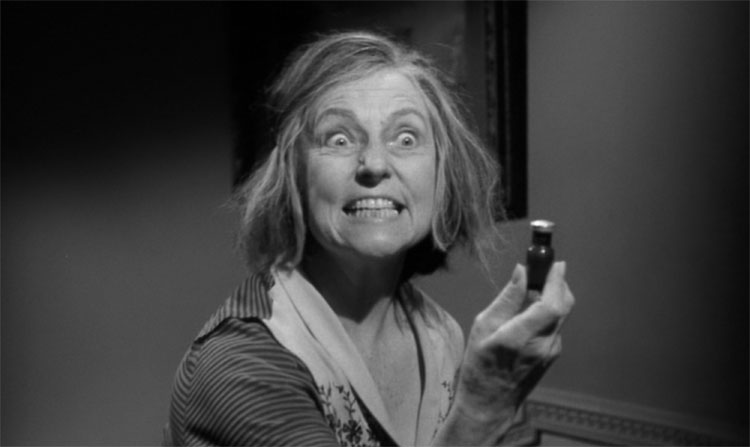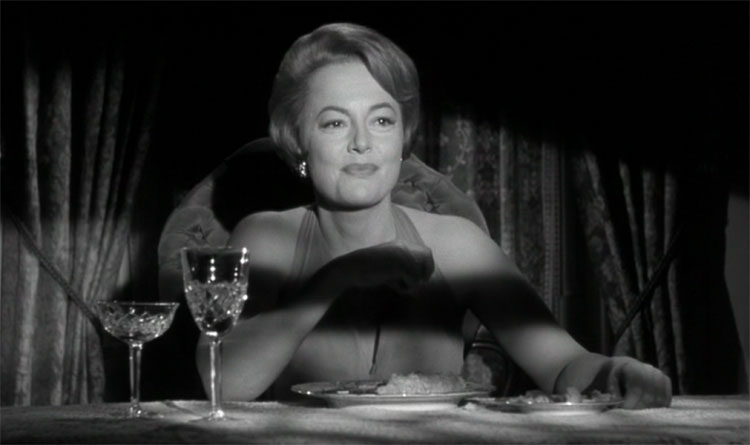Day 18 - "People droppin' like flies every which way!"

I try not to play favorites with your lists of favorites, but I admit: whenever I see a grand dame guignol film pop up, my heart skips like twelve beats. That impending arrhythmia is worth it because man, it's one of my favorite subgenres. Like anyone else who can appreciate a bit of camp, I adore the over-the-top histrionics. But ultimately these films are more than that to me, and I can never look at them exclusively through that lens. And while grand dame guignol tends to land on the trashier side of horror, I also can't see them as mere bottom-rack exploitation flicks poking fun at famous women who dared to age past 50 without sealing themselves away from the public eye. Most of all, as an avowed actressexual there's little I love more than to watch actresses actressing, especially when it's Queens of the Golden Age. So! A big high-five to the two readers who voted Hush...Hush, Sweet Charlotte a favorite in 2020. You know what's up!

After the unexpected success of his 1962 film What Ever Happened to Baby Jane?, director Robert Aldrich said "Hey man, why don't we get the band back together?" (paraphrasing) and took another shot at guignol two years later with Hush...Hush, Sweet Charlotte. As with Baby Jane, writer Lukas Heller adapted a story by Henry Farrell about an aged woman trapped in her past and quite possibly insane. Aldrich cast Victor Buono (last seen during SHOCKtober as The Evil in The Evil!) and reunited Baby Jane and her sister Blanche, with Bette Davis and Joan Crawford on board as Charlotte and her cousin Miriam. After reported on-set arguing--or, as legend tells it, harassment from Davis--Crawford fell ill--or, as the legend tells it, fell "ill"--and returned to Hollywood for a hospital stay. Her lengthy absence resulted in her role being recast, although she still appears in a blink-and-you'll-miss-it shot filmed before she left. After some searching and some convincing, Olivia de Havilland replaced Crawford. (For her part, Crawford said she found out she was fired when she heard it on the radio, and she "cried for nine days" over it. We will never again see the likes of these titans of cinema, I swear!)

Charlotte is a bit more star-studded, if you will, than its grand dame peers. Bruce Dern and my man George Kennedy both appear in early roles, and we get prolific character actress Ellen "Mrs Walton" Corby in a brief appearance as a town gossip. This film, of all things, features the final performance of Mary fucking Astor, who mostly did it as a favor to her friend Davis. The legendary Joseph Cotten (who would go on to reunite with de Havilland in The Screaming Woman and George Kennedy in a few of the Airport films) classes up the joint, and Agnes Moorehead...is such a spectacle in this movie. Every time I see her beyond-outsized performance as Charlotte's housekeeper Velma, I am delighted but I also think to myself, "She really needed a director who would rein her in a bit." Usually I am the person outside the grocery store wearing a sandwich board and complaining that horror performances aren't taken seriously enough, but it's actually insane to me that she was nominated for an Oscar and won a Golden Globe for this. She is a cartoon! I don't think I'm complaining. It's just very strange, is all.

Then again, Bette Davis was nominated for Baby Jane. I guess what I'm saying is that I have lost all of my life savings many times over because of the mercurial nature of the nominating committees. That really adds up over the years. I'm out almost eight dollars!Charlotte begins in Louisiana in 1927, with Big Sam Hollis (Buono) warning John (Dern) to stay away from his daughter Charlotte. No man will ever be good enough for her, especially not one who is (gasp) already married like John. Though the young lovers intended to elope that night during a party, John is intimidated into breaking up with Charlotte, which she takes very well by screaming "I'll kill you!" Moments later, someone uses a cleaver to lop off John's head and hand; when a stunned Charlotte appears on the dance floor with a blood on her gown, people figure she did it.

Fast-forward to 1964 and Charlotte lives alone in her big plantation house, her days and nights spent mostly in reverie as she's attended to by Velma. She's become something of a specter, the local "crazy woman" whose house kids dare each other to approach, as it's widely believed that her father's influence and connections are what helped her avoid being charged with John's murder. When she's informed that she must vacate Hollis House because a new interstate is being constructed, Charlotte summons her cousin Miriam to help her fight The Man. Miriam's motives may not be entirely pure, however. Is she in cahoots with her long-lost boyfriend--and Charlotte's doctor--Drew Bayliss (Cotten)? Is she in cahoots with John's widow Jewel Mayhew (Astor)? Is Charlotte crazy? Is she merely acting crazy? Is she being driven crazy?

Charlotte clocks in at a whopping 133 minutes, but it's never dull and it never feels like time wasted. This is grand dame guignol meets southern gothic, and Aldrich allows the sprawling mystery to unfurl slowly, truly keeping you guessing as to just who's up to just what. It leans into the horror more than many of its peers, as well--it's not just "psycho-biddy," but we get some spooky atmosphere (Charlotte's dream sequence revisiting the 1927 party is a knock-out) and delightful touches, from the surprisingly gory murder scene to the few instances where the dead don't stay quiet. At the heart of many of the films in this subgenre, there is a small tragedy at the heart of things, and Charlotte is no exception. Like another of my favorites, William Castle's Strait-Jacket, Charlotte is the tale of a woman unable to--or perhaps not allowed to--reckon with her past and move on. However, unlike Joan Crawford as Lucy Harbin in Strait-Jacket, Davis's Charlotte is a bit tougher to feel for, which may owe to the fact that Davis is at her shrillest here, shriek-bleating most of her lines. But then, in the film's closing moments, she wordlessly works some magic and you're brought right back to thinking "Oh right, you're Bette GD Davis."

But for me, Hush...Hush, Sweet Charlotte is really Olivia de Havilland's show. Of course, I say that about every movie she's in because I love her so much. The last half hour of this film, as things unravel in many different ways, is where she really shines. In roles that require it of her, I always marvel at her ability to shift emotions completely in a scene--sometimes in a single moment--or do some subtle thing to let us know that what we see on the surface isn't what's going on under the surface. And while I'm certainly not putting her role in Hush...Hush, Sweet Charlotte on par with those in The Heiress or My Cousin Rachel (to name but two), I will say that Olivia de Havilland's line reading of "Oh, I wish to God I'd never come here" alone is worth the ticket price to this. I STAN, OKAY!!!

If you can't tell by now, I love Hush...Hush, Sweet Charlotte. Maybe it's just the southern gothic vibe, I don't know...but it's perhaps the only film of its ilk to qualify as an epic. It's just campy enough, just trashy enough, just tragic enough. And that cast really can't be beat--ah, the actressing! I tells ya, rewatching and (finally) writing about this one...if I didn't have a "write about readers' faves" theme going this month, I'd be talking grand dame for a good while. I'll be crying for nine days just thinking about the possibilities!

